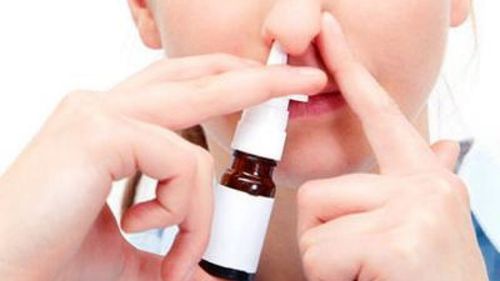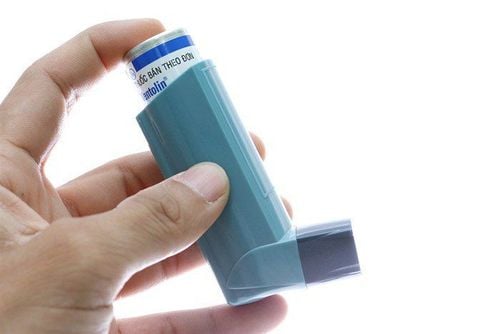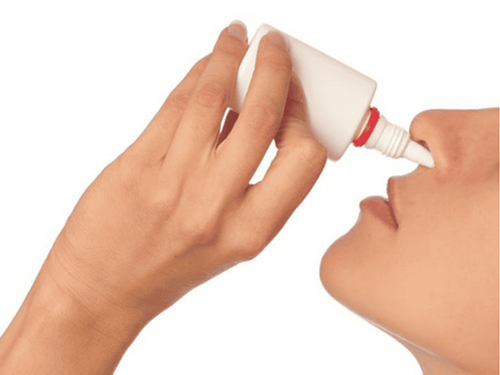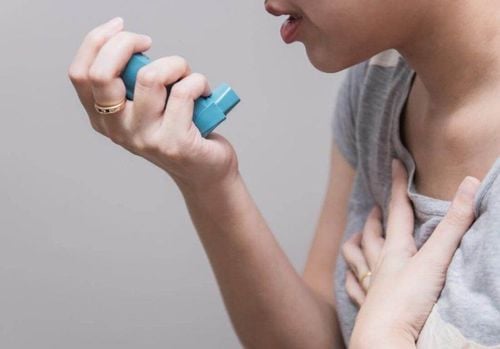This is an automatically translated article.
The article is professionally consulted by Master, Doctor Nguyen Hoang The Nhan - Department of Pediatrics - Neonatology - Vinmec Nha Trang International General Hospital.
Infantile asthma (also called infantile bronchial asthma) is a chronic inflammatory disease of the airways that occurs in infants. This is a common respiratory disease, when an asthma attack occurs, the lining of the bronchi will be thickened, inflamed and irritated. The constriction, edema, inflammation, increased sputum secretion will make the airways narrow, the air flow in and out of the lungs is reduced, and phlegm is blocked.
1. Causes of asthma in babies
Change Weather. Pet dander, smoke, dirt, cigarette smoke, incense smoke, pollen, mold, strong odors such as perfumes, room sprays, mosquito sprays, insects Children with inflammatory diseases Allergies increase the risk of asthma in children. Genetic factors in the family, if one parent has asthma, their child will have a 30-50% chance of having the disease, if both parents have asthma, the child's risk of having asthma will be increased. is 50-70%2. How to recognize asthma in babies
Newborns with asthma often have the following signs:Children cough continuously and persistently, especially at night: Cough is a common symptom of many different respiratory diseases. Asthma's cough has different characteristics from other coughs, such as a short, hissing cough, a cough like lack of oxygen, a cough without phlegm, especially coughs that appear mainly at night because the child's airway is closed. narrow. Child wheezing: A feeling of wheezing, sometimes heard a squeak in the throat when the child breathes. Because when children have asthma, their airways are swollen and narrowed, so when the air passes, it will make a hissing and wheezing sound. Sometimes a baby's throat clears up as a sign of asthma because clearing the throat is a child's attempt to push the mucus out of the throat. Children breathing very quickly and quickly, pale face: Due to the narrowing of the airways, the child lacks oxygen supply, so the child's breathing is very fast, urgent and heavy. Children are poorly adapted to cold weather: Infants with asthma are very poorly adapted to cold weather, when it is cold, children often have a stuffy nose, sneezing, runny nose, difficulty breathing. If the weather changes constantly and the child has breathing problems, it is likely that the child has asthma. Children with allergies or eczema: Studies have shown that children with a history of allergies, dermatitis, or eczema have a higher risk of developing asthma than other children.

Trẻ bị ho kéo dài, liên tục, đặc biệt là hay ho về đêm
3. How to prevent bronchial asthma in babies
Although asthma is difficult to completely cure, but if you follow your doctor's instructions and take effective preventive measures, the disease can be completely controlled.Some of the following precautions parents can take to prevent bronchial asthma in babies:
Absolutely do not smoke in the house and places near children. Do not leave pets like dogs, cats,. .. indoors Avoid using room spray, insect spray, smoke incense Create a cool and fresh living environment for children, regularly clean to remove mold in the house, do not let children play with toys from cotton, feathers, yarn. Limit the use of carpets in the house, clean the children's bedding regularly Studies have shown that, if during pregnancy, the mother smokes, uses antibiotics, uses pain relievers, her children they will later have a higher risk of asthma than other children. In addition, children with psychological stress in the first years of life will have a high risk of asthma later on. Parents need to keep children warm when the weather changes, and limit children's exposure to smoke-polluted areas. , dust, enhance nutrition for children to have resistance, against the risk of disease Asthma is a very common disease in children and infants. If the disease is not detected and treated in time, it will greatly affect the health of children. Asthma can recur frequently with persistent coughs, wheezing, shortness of breath, sleeplessness, and fatigue. If not well controlled, it can lead to dangerous complications such as atelectasis, respiratory failure, bronchitis, chronic bronchiectasis, emphysema, pneumothorax, respiratory arrest with brain damage, etc. ..
When children have signs of asthma, parents should quickly take their children to medical facilities for timely diagnosis and treatment. Depending on the child's condition, the doctor will have suitable treatment methods. Parents' compliance with the doctor's instructions and the correct use of prescribed medicines to relieve or prevent asthma have great implications for the health and quality of life of their children.

Nên đưa trẻ tới thăm khám bác sĩ khi có các dấu hiệu trên
Screening for early detection to promptly control and treat the disease Perform clinical examination, take medical history, measure respiratory function, otolaryngology and clinical examination bronchial filter. When registering for the Asthma Screening Package, customers will receive:
01 appointment with an Allergist - Clinical Immunology 01 screening tests: Measurement of respiratory function Measuring FeNo Otolaryngoscopy Allergen Test
Please dial HOTLINE for more information or register for an appointment HERE. Download MyVinmec app to make appointments faster and to manage your bookings easily.













